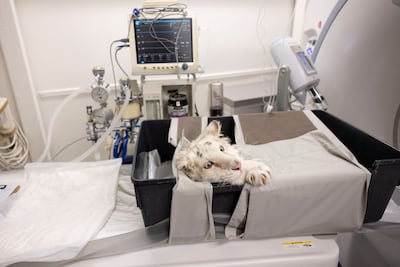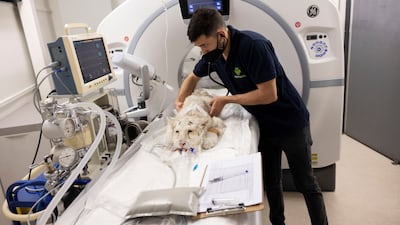Greek veterinarians are fighting to save a white tiger cub abandoned in a rubbish bin at an Athens zoo.
The three-month old white tiger, who was found thin and dehydrated on February 28, is believed to be a victim of the illegal wildlife trade.
“It is the first time ever we had such an animal dumped outside our zoo,” said zoo founder Jean-Jacques Lesueur.
“I mean we had a number of cases of animals dumped, but usually these are abandoned pets — puppies, kittens, tortoises … but a tiger? Never.”
A team of veterinary surgeons helped with the cub's check-up and CT scan earlier this week.
“When I first saw the cub, I couldn't believe what I was seeing in front of me. I honestly couldn't believe that an animal was in such a state,” said wildlife veterinary surgeon Arsinoi Psaroudaki.
“She was probably fed an improper diet, and she is severely deficient in vitamins and minerals, and this makes her bones extremely fragile.”
X-rays also showed a metal pin has been placed in one of the cub's back legs.
Mr Lesueur said if the tiger survives, it will have to be relocated to a sanctuary, as the zoo has no other animals of its kind. International wildlife and animal welfare organisations have already contacted the zoo to help, he said.
The zoo's head keeper for cats, Andrea Cerny, said due to their size, diet and aggressiveness, tigers were difficult to care for.
“A tiger definitely cannot be a pet. It is a very dangerous animal, with a very big killing instinct,” she said. “Most of these pet tigers are going to be abandoned or killed.”
The tiger was left under a rubbish bin in the car park at Attica Zoological Park by a cleaner, who notified the zoo owner.
The zoo's security camera video shows a vehicle driving up to the bins before midnight the previous night. Authorities were trying to trace the licence plates, said Mr Lesueur.
The wildlife trade in Europe is a billion-euro business, according to Europol, and Asia and Africa are common origins of exotic animals sold to European buyers.
“We know that animals enter Greece illegally — snakes, tigers, like this one, it is not the first time a tiger has entered,” said Maria Ganoti, head of Greek wildlife rescue association Anima, which has often cared for wild animals that have been abandoned.
“These usually come from entry points like Turkey, or Cyprus, but Greece has started to become an entry gate for the rest of Europe.”
Sukuk explained
Sukuk are Sharia-compliant financial certificates issued by governments, corporates and other entities. While as an asset class they resemble conventional bonds, there are some significant differences. As interest is prohibited under Sharia, sukuk must contain an underlying transaction, for example a leaseback agreement, and the income that is paid to investors is generated by the underlying asset. Investors must also be prepared to share in both the profits and losses of an enterprise. Nevertheless, sukuk are similar to conventional bonds in that they provide regular payments, and are considered less risky than equities. Most investors would not buy sukuk directly due to high minimum subscriptions, but invest via funds.
Other ways to buy used products in the UAE
UAE insurance firm Al Wathba National Insurance Company (AWNIC) last year launched an e-commerce website with a facility enabling users to buy car wrecks.
Bidders and potential buyers register on the online salvage car auction portal to view vehicles, review condition reports, or arrange physical surveys, and then start bidding for motors they plan to restore or harvest for parts.
Physical salvage car auctions are a common method for insurers around the world to move on heavily damaged vehicles, but AWNIC is one of the few UAE insurers to offer such services online.
For cars and less sizeable items such as bicycles and furniture, Dubizzle is arguably the best-known marketplace for pre-loved.
Founded in 2005, in recent years it has been joined by a plethora of Facebook community pages for shifting used goods, including Abu Dhabi Marketplace, Flea Market UAE and Arabian Ranches Souq Market while sites such as The Luxury Closet and Riot deal largely in second-hand fashion.
At the high-end of the pre-used spectrum, resellers such as Timepiece360.ae, WatchBox Middle East and Watches Market Dubai deal in authenticated second-hand luxury timepieces from brands such as Rolex, Hublot and Tag Heuer, with a warranty.
More from Neighbourhood Watch:
The years Ramadan fell in May
The burning issue
The internal combustion engine is facing a watershed moment – major manufacturer Volvo is to stop producing petroleum-powered vehicles by 2021 and countries in Europe, including the UK, have vowed to ban their sale before 2040. The National takes a look at the story of one of the most successful technologies of the last 100 years and how it has impacted life in the UAE.
Read part four: an affection for classic cars lives on
Read part three: the age of the electric vehicle begins
Read part one: how cars came to the UAE
Timeline
2012-2015
The company offers payments/bribes to win key contracts in the Middle East
May 2017
The UK SFO officially opens investigation into Petrofac’s use of agents, corruption, and potential bribery to secure contracts
September 2021
Petrofac pleads guilty to seven counts of failing to prevent bribery under the UK Bribery Act
October 2021
Court fines Petrofac £77 million for bribery. Former executive receives a two-year suspended sentence
December 2024
Petrofac enters into comprehensive restructuring to strengthen the financial position of the group
May 2025
The High Court of England and Wales approves the company’s restructuring plan
July 2025
The Court of Appeal issues a judgment challenging parts of the restructuring plan
August 2025
Petrofac issues a business update to execute the restructuring and confirms it will appeal the Court of Appeal decision
October 2025
Petrofac loses a major TenneT offshore wind contract worth €13 billion. Holding company files for administration in the UK. Petrofac delisted from the London Stock Exchange
November 2025
180 Petrofac employees laid off in the UAE





